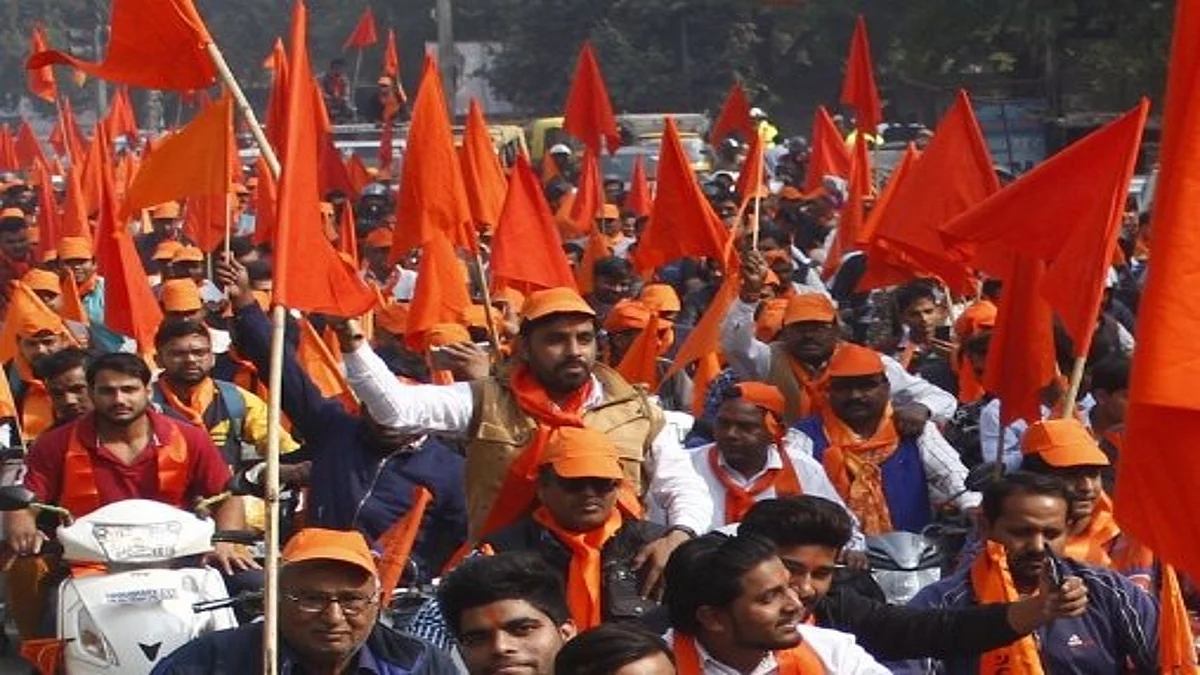BJP plans to keep communal pot boiling for electoral gains; it cares little for international image
As is clear from BJP’s dismissive attitude towards external censure of its authoritarianism, it has ceased to care about its international image as long as its policies pay political dividends at home

If anyone believed that the construction of the Ayodhya temple will enable the Hindus and Muslims to live happily ever after, then he lives in a fool’s paradise.
No sooner had the Sangh parivar and the BJP found that their wishes on the Ram temple have been fulfilled than they turned their attention to the Varanasi and Mathura mosques which have long been in their cross-hairs. As one of their slogans announced against the background of the Ayodhya temple issue, “yeh toh pehli jhanki hai, Kashi, Mathura bakihai” (this is only the first step, Kashi, Mathura are still left).
Not surprisingly, a petition has been filed in the Supreme Court on the validity of the 1991 law which favours a status quo in all the places of worship. The law was enacted in the aftermath of the threatened demolition of the Babri masjid so that the parivar activists do not take their pickaxes and shovels to any other mosque in order to bring it down.
It is no secret that the choice of the Babri masjid for destruction was not made so much because of the religious zeal of the Hindutva forces to “liberate” Lord Ram’s birthplace as to foment anti-Muslim sentiments by focussing on the evil deeds of the Muslim invaders of the medieval times to destroy temples and build mosques in their place. Now that the Ayodhya site has been ‘reclaimed’ in favour of the Hindus, it is time for the activists to identify other targets such as in Varanasi and Mathura for, as the slogan says, “teen nahin, teen hazar, nahin rahegi ek mazar” (not three, but three thousand, not a single place of worship will remain).
By challenging the 1991 Act, the parivar and the party can be said to have embarked on their post-Ayodhya journey to break other mosques. But, even as the Supreme Court awaits the government’s response to the petition calling for invalidating the existing law, there will undoubtedly be arguments and counter-arguments on the issue, which will serve the purpose of keeping the issue alive and exacerbating Hindu-Muslim tension.
Consequently, one of the BJP’s political objectives – that of keeping the communal pot boiling – will be served. This intent is a key feature of the BJP’s politics since it is mostly on the basis of arousing anti-Muslim sentiments that the party believes that it can keep on its side the otherwise restive Hindu middle class with its concerns about unemployment and inflation.
However, it is a two-track approach. Even as the party mouths platitudes on sustaining the nation’s democratic credentials and demonstrating its technological prowess by sending satellites into space, its foot soldiers use both judicial and extra-judicial means to advance the party’s pro-Hindutva agenda.
Among their favoured methods are initiatives to erase the Muslim names of well-known towns such as Allahabad and Mughal Sarai, which have been renamed Prayagraj and Deen Dayal Nagar, and to pass laws against interfaith marriages.
However, even as these relatively minor steps are taken to keep the minority community in a state of unease, the targeting of the Varanasi and Mathura mosques are undoubtedly major events comparable to what happened in Ayodhya in the 1990s when nationwide riots broke out before and after the demolition.
Since the name of Aurangzeb, the most reviled of the Mughal emperors in the eyes of the Hindutva votaries, is associated with the Varanasi and Mathura mosques, it will be easy for the BJP to revisit the entire history of assaults on Hindu temples by the Muslim invaders as the party’s propagandists did in the 1990s while targeting the Babri masjid.
It is too early to say how a replay of the Ayodhya episode will unfold, but what is obvious is that the sidelining of the 1991 law is fraught with unforeseen consequences. Even if the government is wary of an outbreak of violence because of the damaging impact on its image, it may find it difficult to control the hotheads in the saffron ranks once the atmosphere heats up in Varanasi and Mathura and, indeed, all over the country.
The problem of restraining them will be all the greater because the two mosques have been on the BJP’s list of targets for far too long to be set aside. Moreover, since the Babri masjid demolition was behind the BJP’s transition from the margins of politics to centre-stage, the party is likely to see any destructive action in the two towns in the same light, hoping for a further consolidation of its political position.
As is evident from the party’s dismissive attitude towards external censure of its authoritarianism, the BJP has ceased to care about its international image as long as its policies pay political dividends at home. But how the Indian public responds to the breaking of more mosques is the million dollar question.
IPA Service
Views expressed are personal
Follow us on: Facebook, Twitter, Google News, Instagram
Join our official telegram channel (@nationalherald) and stay updated with the latest headlines
